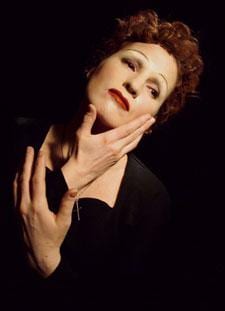“Quand il me prend dans ses bras… Il me parle tout bas, je vois la vie en rose…”
The song was written by the brassy, flamboyant and talented Edith Piaf in the 1940s, and it’s been covered by more than 80 artists since. Its yearning, romantic strains will soon be heard live in Ottawa, along with a dozen other of Piaf songs, performed by Naomi Emmerson in the one-woman show Piaf: Love Conquers All.
Developed more than 15 years ago, this 90-minute play was written by Roger Peace and is directed, designed and artistically produced by Naomi Emmerson. The show first gained acclaim at the 2005 Toronto Fringe Festival, and it has been touring every year since — in Canada, the United States and even the Philippines.
The set is designed in a minimalist, even cartoonish style of bold white cutouts against a black backdrop — with the occasional splash of red in the character’s lipstick or in the petals of a rose. Emmerson’s voice and characterization dominate the show, her singing accompanied only by acoustic piano. Wearing the same little black dress for most of the play, Emmerson reenacts the struggles and passions of the woman whose voice took France by storm at the height of World War II.
Born Edith Giovanna Gassion in 1915, Piaf’s pseudonym comes from the Francilien for “sparrow.” The streets of Belleville, Paris, and a brothel in Normandy were her childhood haunts before she began touring with her father, a street acrobat, at the age of 14.
By age 20, she would be discovered by a Parisian club owner. Following his (suspicious) murder, her agent changed her name to “Piaf” in an effort to distance her from the shadiness of the case. By the end of World War II, she was not only one of the foremost songstresses in France, she was renowned internationally.
As the play recounts, Piaf was known for mentoring and sleeping with young singers to start their careers, leaving them if they became more famous than she was. The world championship boxer, Marcel Cerdan, was an object of Piaf’s affection, and neither his marriage nor his three children put a stop to their torrid affair — the plane crash that resulted in his death devastated her.
Rheumatism and morphine addiction soon eclipsed her life, but she married, divorced and married again before her death in 1963. Despite the scandals and ailments, she kept singing till the end. She died at the age of 47 from liver cancer after a life of love affairs, heartbreak, drug addiction, controversy and, most of all, fame.
The talent that fuelled her reckless rises and falls truly captured the world’s imagination. She has inspired plays and movies — most recently the 2007 César- and Academy Award-winning film, La Vie en Rose. As fascinating as she was to the general public, Piaf won over the hearts of generations of gay men.
It’s easy to see how the bold and glamourous woman, who stood onlu 4’8” but had a powerhouse voice that won her riches and devotion, would be an inspiration to anyone who wants to live their “life in pink.” She refused to let gender-normative expectations and the disapproval of the Catholic Church stop her from living the life she wanted, and sharing the art she created.
Her legacy can be experienced through films like La Vie en Rose and plays like Love Conquers All. If you yearn to immerse yourself in Piaf’s inspiring power — and listen to her most famous songs in their original French — then Naomi Emmerson’s show is a must-see.

 Why you can trust Xtra
Why you can trust Xtra


